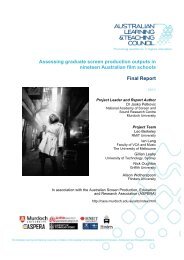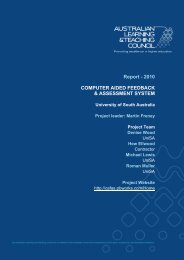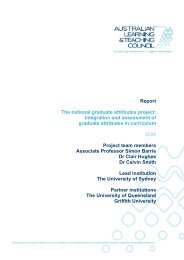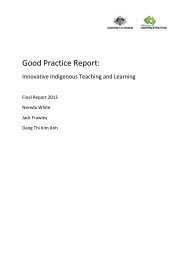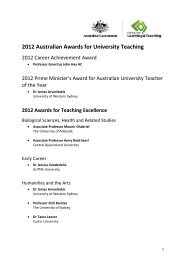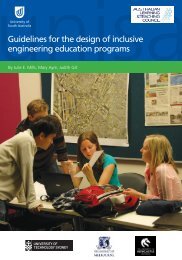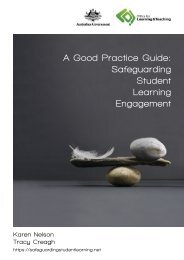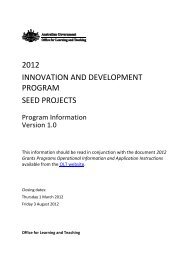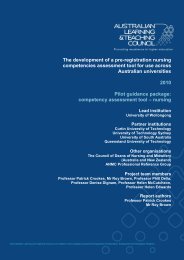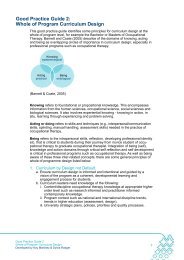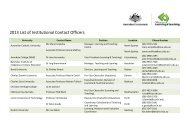confusing”.(4) Where do you normally do your study? Why?Only one student sometimes studied in the university <strong>and</strong> sometimes studied athome. She felt that studying on the university campus was efficient. The other sixstudents liked to study at home <strong>and</strong> one of them commented, “The reason is it’s themost convenient place to get it done as it seem to be the best place”.(5) Do you spend much time studying in the campus? Why/ why not?All seven local students liked to study at home. They only studied in university if theyneed to, such as when downloading or doing group work. One student commented,“I was spending a lot of time at the campus as I was an internal student but at themoment I do not spend much time there at all as I am an external student I do notget the time to go there <strong>and</strong> I do everything through the computer <strong>for</strong> the best part ofthe time”. One student commented, “I only go there sometimes if I need to use atextbook or use their net to download something”. One student commented“particularly if I am participating in group study or group tasks”.5.3.4 Study difficulties(1) Local students: what were the main study difficulties you encountered in 1styear?All seven students had some difficulties, which can be divided into two categories.The first was that new students need time to get used to learning methods in theuniversity as they are different from those in high school. One of them commented,“University study is a lot different to high school, you are not pushed <strong>and</strong> you mustrely on yourself to get in <strong>and</strong> get the work done”. The second was that new studentsneed time to get used to the teaching methods; as one of them commented,““Referencing with textbooks, finding a balance with life <strong>and</strong> university as well ashelp from teachers”.5.4 Graduates interview data analysisA total of 10 graduates of Asian background participated in the interview.5.4.1 <strong>Teaching</strong> Content <strong>and</strong> Textbooks(1) Do you have any difficulties in reading textbook?Nine graduates had language problems when they read textbooks. For example,one graduate said, “English is my second language, so sometimes it is really hard tofind out the meaning of a word”. Only one student has no difficulties. He said, “I findI do not have too many difficulties whilst reading Australian textbooks, becausewhen … the lecturer chooses the textbooks, they take into consideration that thisbook would be useful to both local <strong>and</strong> international students”.(2) Do you think reading the textbook is very important to your study?Eight graduates thought the textbook was very important. For example, onegraduate said, “It is very important. Many people find the examples really important.Be<strong>for</strong>e going to a particular exam you need to know something about the material,so the textbook <strong>and</strong> examples are really important”. Two students thought it was notthat important. One of them said, “I do not think that the textbook is really importantto me, I believe that the textbook is only a part of the idealistic reference material”.(3) How many hours are spent in reading textbooks per week?One graduate spent two to three hours per week. Two graduates spent 5-10 hoursper week on textbooks. Five graduates spent more than 20 hours per week.(4) What do you do when you can’t underst<strong>and</strong> your textbooks?89
When they have difficulties in reading textbooks, one of them chose to consult adictionary <strong>and</strong> ask lecturers. He said, “The first thing I can do is to look at adictionary <strong>and</strong> find the meaning by myself. If I still can’t underst<strong>and</strong> I will ask thelecturer, <strong>and</strong> they will give me in<strong>for</strong>mation <strong>and</strong> help me”. Another chose to get helpfrom a learning assistant in the university. He said, “I went to a ‘<strong>Learning</strong> Official’,she was very nice, <strong>and</strong> guided me how to read the textbook properly, doassignments, everything. … sometimes I would ask my friends the meaning”. Six ofthem chose to discuss with their lecturers <strong>and</strong> classmates. For example, onegraduate said, “I’d normally ask in the tutorial, or if I don’t have a chance, I will askanother student, or wait <strong>and</strong> try to ask the lecturer after class”.(5) What constitutes a good textbook?There were 6 graduates who thought a good textbook should combine theory <strong>and</strong>practical examples. For example, one graduate said, “I am especially interested inthe examples given in a book, real life examples <strong>and</strong> case studies. A textbook thatfocuses too hard on just theory is not very interesting, it can be boring.” Onegraduate considered picture <strong>and</strong> graph were essential parts of a good textbook. Hesaid, “When it has more topics, I like it to be easy to find keywords <strong>and</strong> have asimple structure.”(6) What do you learn most from a textbook?There were 4 graduates who thought that theory <strong>and</strong> concept from textbooks werevery important to them. For example, one graduate said, “I can learn most of thetheory from a textbook”. Two students prefer examples. One of them said he learnta lot of examples that address real world case studies, <strong>and</strong> calculations. Onegraduate thought he could find some detail about the course from a textbook; hesaid, “You learn the summary of your course from the textbook, <strong>and</strong> exp<strong>and</strong> on thatwith lectures, internet <strong>and</strong> library material”. One graduate said he learned keyin<strong>for</strong>mation about the subject from textbooks.(7) Do you think it’s important that a textbook emphasises theory?There were 2 graduates who thought that textbooks should emphasise theory. Fivegraduates believed that both theory <strong>and</strong> practical examples should be emphasised.For example, one of them said, “There is a bond between theories <strong>and</strong> exercises.You cannot separate those two processes as they are h<strong>and</strong> in h<strong>and</strong> ….”(8) Do you think reading the textbook is a very important learning exercise?There were 4 graduates who thought reading the textbook was very important <strong>for</strong>their learning. For example, one graduate said, “Yeah, I think so. Be<strong>for</strong>e I attendclass I will read the relevant material quickly, <strong>and</strong> after class I will go over it againbut more slowly, to fully underst<strong>and</strong> those things”. Three graduates said this shoulddepend on whether the textbook has enough practical examples. For example, onegraduate said, “There are links between textbooks <strong>and</strong> exercise … Although thetheories from the textbook can sometimes guide you how to operate, when you areactually working, there are many differences between theories <strong>and</strong> learningexercise”.5.4.2 <strong>Teaching</strong> <strong>and</strong> <strong>Learning</strong> Methods(1) Can you tell me which teaching method(s) you have come across are the mosteffective?All graduates had their unique most effective teaching methods such as small groupteaching, group discussion, tutorial, lecture note <strong>and</strong> PowerPoint materials, casestudies <strong>and</strong> connections between lecturer <strong>and</strong> students. The comments were asfollows:““In my opinion, I feel that small groups …There<strong>for</strong>e, I prefer the tutorial method ofteaching.”“PowerPoint is good <strong>for</strong> me.”90
- Page 1 and 2:
Strategies and Approaches toTeachin
- Page 3 and 4:
Table of Contents0 EXECUTIVE SUMMAR
- Page 5:
0 Executive SummaryAustralian terti
- Page 8 and 9:
1 Project OutcomesThe outcomes of t
- Page 10 and 11:
The identification information sect
- Page 12:
questions aim to discover their ass
- Page 15 and 16:
3.2 Literature reviewCross-cultural
- Page 17 and 18:
4 Survey Data AnalysisThis section
- Page 19 and 20:
Total Count 380 632 1012Percentage
- Page 21 and 22:
2 Count 12 30 42Percentage 3.1% 4.7
- Page 23 and 24:
Table 13 shows that nearly all loca
- Page 25 and 26:
methods are good, while less than h
- Page 27 and 28:
Preferredfewerlectures andmore labs
- Page 29 and 30:
Table 26 (Question III.4.D) Preferr
- Page 31 and 32:
Maindifferencesbetweenteachingmetho
- Page 33 and 34:
Table 33 shows that about half of l
- Page 35 and 36:
Table 38 (Question IV.4) Sufficient
- Page 37 and 38:
understanding lectures?Table 42 (Qu
- Page 39 and 40: confident Count 301 179 480Percenta
- Page 41 and 42: Table 49 (Question VI.4) Caring abo
- Page 43 and 44: Table 52 shows that more local stud
- Page 45 and 46: Table 56 shows that both local and
- Page 47 and 48: a chi-square test to determine whet
- Page 49 and 50: Significance Level (α= 0.05)Hypoth
- Page 51 and 52: presentations are unrelated (Indepe
- Page 53 and 54: Hypotheses V.2H0: Student category
- Page 55 and 56: encountered at university in 2/3/4
- Page 57 and 58: III.7What are you most concerned ab
- Page 59 and 60: II.6.EII.6.FII.6.GTextbooks you pre
- Page 61 and 62: VII. OtherVII.1.1VII.1.2What are th
- Page 63 and 64: III.6 Do you like lecturers to ask
- Page 65 and 66: distribution of these comments acro
- Page 67 and 68: Figure 4.5 University of Sydney und
- Page 69 and 70: Australia is the environment (11.06
- Page 71 and 72: example, one student said that home
- Page 73 and 74: 5 Interview Data AnalysisThis secti
- Page 75 and 76: class?Eight students thought studen
- Page 77 and 78: (1) Did you have any difficulty sel
- Page 79 and 80: 5.2 Staff interview data analysisA
- Page 81 and 82: (2) Do you think that the methods y
- Page 83 and 84: is the biggest problem”. One lect
- Page 85 and 86: comments was, “No, I send them to
- Page 87 and 88: lecturer, and one of them like the
- Page 89: am a shy person I am not comfortabl
- Page 93 and 94: (7) Have you been involved in many
- Page 95 and 96: Only two of the graduates had diffi
- Page 97 and 98: Furthermore, I was not familiar wit
- Page 99 and 100: ased communication style such as e-
- Page 101 and 102: CrosstabDifficultieswhenreadingtext
- Page 103 and 104: CrosstabPreferred workingin groups
- Page 105 and 106: CrosstabMain differencesbetween tea
- Page 107 and 108: CrosstabWhat are the maindifficulti
- Page 109 and 110: CrosstabDo you have anyEnglish lang
- Page 111 and 112: CrosstabDo you have anyEnglish lang
- Page 113 and 114: CrosstabAre you confidentabout your
- Page 115 and 116: CrosstabDo you have anyEnglish lang
- Page 117 and 118: CrosstabWhat are the mainstudy diff
- Page 119 and 120: Pearson Chi-SquareLikelihood RatioN
- Page 121 and 122: ead lecture notes.2. Regarding the
- Page 123 and 124: II.9 0.022 0.097 0.174 0.02 0.135II
- Page 125 and 126: From Table 65, we can see that ther
- Page 127 and 128: countries peoples. Personally, I fi
- Page 129 and 130: perceived by them as something insi
- Page 131 and 132: 7. Arrange peer groups for those st
- Page 133 and 134: covered (or not covered well) in th
- Page 135 and 136: 13. Ask assistance from internation
- Page 137 and 138: 11) • Weekly groupcase studies an
- Page 139 and 140: 8 Guideline for International Stude
- Page 141 and 142:
life. However, it is very important
- Page 143 and 144:
There are ways of maintaining focus
- Page 145 and 146:
Expect to be nervous initially and
- Page 147 and 148:
Avoid cheating and plagiarismAustra
- Page 149 and 150:
9 Disciplinary and interdisciplinar
- Page 151 and 152:
10 Results communication, publicati
- Page 153 and 154:
Visiting Professor Javier Montero f
- Page 155 and 156:
11 ReferencesAsmar C. (1999), Schol



